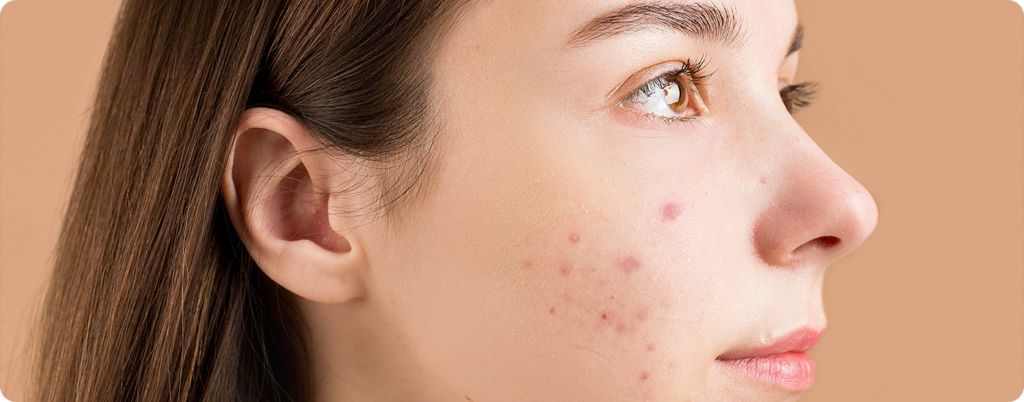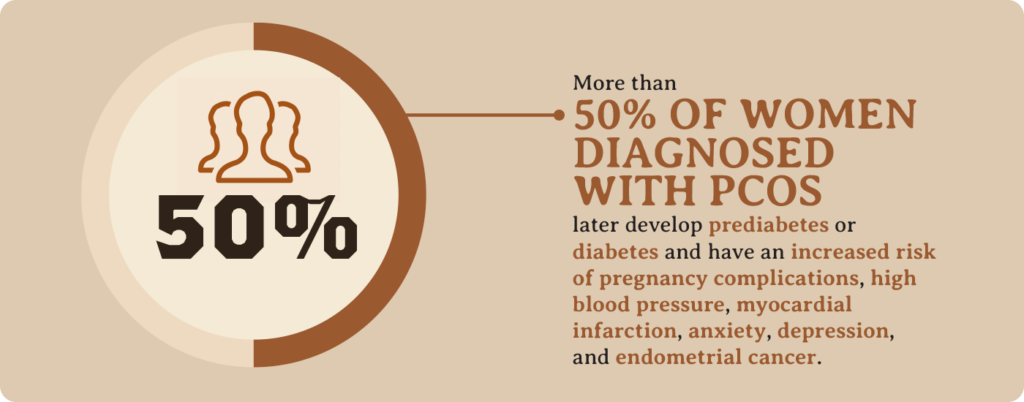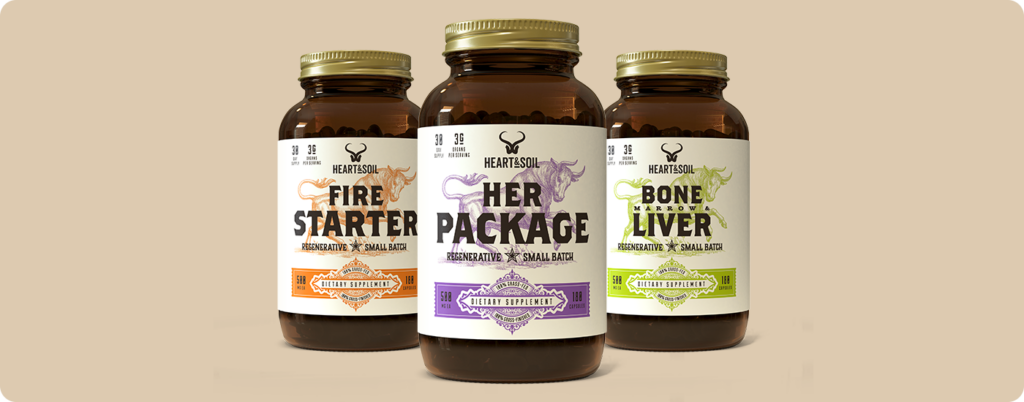PLEASE NOTE: The information in this blog is for educational purposes only. It is not a substitute for professional medical advice. Consult your healthcare provider if you’re seeking medical advice, diagnoses, or treatment.
Despite the implications, polycystic ovary syndrome (PCOS) is a condition that remains poorly understood and cared for. Fortunately, diet and lifestyle principles can make a huge difference in your quality of life, whether you’ve been diagnosed with PCOS or want to improve your hormonal health.
This article will briefly cover what we know about PCOS and ways that you can address some of the possible root causes as well as:
- Building a lifestyle and diet for reproductive health
- The H&S supplements we suggest
- Resources to learn more
What Is Polycystic Ovary Syndrome?
Polycystic ovary syndrome (PCOS) affects 1 in 10 women (1) and is a leading cause of infertility. PCOS is usually diagnosed by the presence of at least two out of three symptoms:
- Anovulation (bleeding without egg release), irregular periods, or no periods at all.
- High levels of androgens or an abnormal ratio of androgens to estrogen.
- Abnormal growths on the ovaries, known as cysts.
Women with PCOS often deal with insulin resistance, fatigue, sleep apnea, obesity, acne, skin disorders, and excessive body hair growth (2).
 More than 50% of women diagnosed with PCOS later develop prediabetes or diabetes and have an increased risk of pregnancy complications, high blood pressure, myocardial infarction, anxiety, depression, and endometrial cancer (3).
More than 50% of women diagnosed with PCOS later develop prediabetes or diabetes and have an increased risk of pregnancy complications, high blood pressure, myocardial infarction, anxiety, depression, and endometrial cancer (3).

While the exact cause of PCOS is unknown, the condition is associated with chronic inflammation. Several theories suggest the root cause may be insulin resistance, leading to increased androgen levels (4). You are also more likely to experience PCOS if your’re obese or your biological mother or sister has PCOS (5).
PCOS is linked to hormone and metabolic function, systems that are intertwined (6). Conventional Western medicine generally tries to address these issues with therapies for symptoms instead of root causes, using birth control to regulate menstruation, for example. Of course, the root cause of PCOS hasn’t been confirmed, but it stands to reason that restoring healthy hormones and metabolic function is an excellent place to start.
And that’s where Heart & Soil can help you. As a fierce advocate for animal-based nutrition and maker of supplements designed to support healthy metabolic function, it’s possible to live a life that is free from the symptoms of PCOS.
Building a Diet and Lifestyle for Hormonal Health

We’ve compiled a list of practical steps to help you create a fulfilling and fundamentally healthy life. We recognize that every human is unique, and what’s right for you may differ from these suggestions. The guiding principle is to align with a lifestyle similar to our ancestors, especially in physical activity, food, and recovery.
Modern humans have adopted sedentary lives and diets that undermine our physiology and psychology (7). Chronic inflammation and metabolic dysfunction are so widespread in the US population that poor health has almost become “normal.”
Some of these eight steps or practices are immediately actionable (such as focusing on sun exposure and getting exercise) others require a long-term commitment (such as eliminating seed oils and managing stress). The goal is to start with baby steps and gradually progress as your comfort and confidence grow.
1. Eliminate Seed Oils.
Processed vegetable oils (corn, safflower, sunflower, soybean, cottonseed, canola, peanut, grapeseed, sesame, etc.) contain high levels of linoleic acid (omega-6 PUFA). Linoleic acid is an essential fatty acid, but problematic at high levels.
It would be presumptive to say that all metabolic dysfunction results from insulin resistance brought on by excess linoleic acid consumption. However, as stated in this white paper by Zero Acre Farms (8), “There is no tribe, population, or nation that has started consuming vegetable oils and not seen obesity rates climb.”
That leads us to believe that the best way to restore healthy metabolic function and insulin sensitivity is to reduce harm from substances like excess omega-6 PUFA consumption.
To counteract the superabundance of linoleic acid, we suggest replacing seed oils with tallow, ghee, butter, and other nourishing saturated fats. This also means reading ingredient labels and avoiding most packaged foods. Industrial food production relies on seed oils because they’re cheap and abundant. When dining out, you can request the kitchen cook your food in butter or without vegetable oil.
It’s also important to source your olive and avocado oils from reputable brands. With no exaggeration, 79% of the brands at the grocery store cut their products with soybean, canola, or some other vegetable seed oil (9).
Additionally, do your best to avoid fatty pork, chicken, duck, turkey, or other monogastric animals primarily fed corn and soy diets. Like humans, these animals will store excess linoleic acid in their fat cells, which is easily absorbed when we eat them.
2. Prioritize Grass-Fed, Grass-Finished Meat and Organs.
Incorporating unprocessed meats into your diet can be a delightful way to get the macro (protein, fat) and micro (vitamins, minerals, peptides) nutrients your body needs. We suggest you focus on meat and organs from grass-fed ruminant animals such as cattle, buffalo, goat, lamb, and deer. If you can find high-quality, fresh organ meat, start with the liver and heart.
If you consume poultry, eggs, or pork, stick with corn-and-soy-free or pasture-raised options such as White Oak Pastures, Nose to Tail, or a local farmer.
Industrial farms rely on cheap corn and soy-based feeds to raise and fatten their animals. Even “organically raised” animals may be fed organic corn and soy — resulting in a buildup of linoleic acid in their fat tissues.
We also suggest consuming bone broth made from bones and connective tissue. High-quality bone broth contains an important amino acid called glycine, which plays several roles in our physiology (10). It functions as a neurotransmitter in the brain and supports relaxation (11)!
3. Eliminate the Most Toxic Plant Foods.
As discussed in Dr. Paul Saladino’s book, The Carnivore Code, specific plant components contain defense chemicals that can negatively trigger the immune system. The most problematic ones are typically leaves, stems, seeds, nuts, grains, nightshades, and legumes.
Sources of low-toxicity carbohydrates are honey, berries, avocados, olives, squash, or other seasonal sweet and non-sweet fruit. Organic white rice and sweet potatoes can be good options as well. Feel free to check out our animal-based infographic for a breakdown of high and low-toxicity plant foods.
4. Adequately Nourish Your Body.
Eating individually-sufficient amounts of animal-based fat, meat, organs, raw dairy, fruit, and other carbohydrates helps hormones, energy, mood, immunity, and digestion thrive.
In addition to organs, consuming lots of protein in the form of sustainably raised meat is essential. You also need sufficient fat and carbohydrates to achieve the best nutrition possible.
The following formulas will help you assess the proper macronutrient ratios for your needs.

Regarding your fat and carbohydrate intake, if your total activity level is on the lower end of the spectrum, you should experiment with the lower end of the range, but if you are more active, try the higher end of the range.
If you are insulin resistant, diabetic, or pre-diabetic, you may benefit from a 30-day trial of decreasing carbohydrate intake to around 50-75g daily. If you choose this approach, please consult your physician to develop a plan that suits your unique medical needs.
5. Prioritize Sleep and Recovery.

Few things are as simple, cost-effective, and beneficial as quality sleep. During sleep, your body builds, repairs, and heals from the various stressors of life. We suggest turning off devices with screens one to two hours before bed (12), dimming the lights (Dr. Paul’s podcast on light), being consistent with your bedtime, and aiming for 7-9 hours of sleep.
6. Move and Exercise.
Good stress, such as exercise, triggers critical processes and helps to regulate your hormones.
Even the simple act of walking a few miles a day is beneficial. Ideally, you can incorporate slow movement (like walking) with strength training and high-intensity movement like sprinting. Taking a short walk after meals can even help regulate your blood sugar (13).
7. Sunbathe.
Whatever you’ve heard about the dangers of sunlight, the reality is that our bodies use sunlight to produce vitamin D and nitric oxide (14), which also help regulate hormones, decrease blood pressure (15), and improve overall blood flow.
Go outside, play in the sun, and enjoy nature while you’re at it. Daily sun exposure can stimulate your natural circadian rhythm, promoting sleep (16), recovery, and muscle growth. It may even improve the alpha diversity of the gut (17)!
8. Manage Stress.

Everyone experiences some levels of stress on a daily or weekly basis. This is completely normal! To create an optimal healing environment inside our bodies, we must take the time to care for ourselves. We challenge everyone to engage in some stress management activity.
Meditation, prayer, sitting down outside and connecting with nature, gardening, or even learning a new skill can all be enjoyable ways to reduce stress (18,19,20).
9. Reduce Exposure to Toxins.
Exposure to environmental toxins, such as certain chemicals, pollutants, or heavy metals, can trigger PCOS and other hormonal issues (21,22). To help offset the effects:
- Use air and water filters in your home.
- Opt for organic fruits to reduce your exposure to pesticides and other synthetic inputs.
- Choose natural cleaning, personal care products, clothing, and bedding made from organic cotton, hemp, or bamboo, free from parabens and synthetic fibers (23).
- Check out Dr. Paul’s video on environmental toxins for more info.
- Engage in regular detoxification practices such as exercise and sauna sessions.
These challenges usually cannot be solved overnight, but with time and patience, our bodies and minds can heal incredibly.
The PCOS Supplement Stack

As part of our suggestion to adopt an animal-based diet, we also suggest consuming organ meats. Most people find it difficult to source high-quality organ meats, and many find organs distasteful. If this is the case, our supplements are a great alternative.
Our supplements contain freeze-dried, powdered organ meats from grass-fed, grass-finished cattle. Think of them as a shelf-stable, preservative-free way to consume all the potent vitamins, minerals, peptides, growth factors, and fats in organs.
Although we call them supplements, they don’t contain any synthetic compounds like most over-the-counter supplements. They’re food in capsule form!
1. Her Package
The first supplement in our PCOS stack is Her Package. Formulated from the principle that “like supports like,” Her Package contains bovine ovaries, fallopian tubes, uterus, liver, and kidney. This combination supplies important tissue-specific nutrients, proteins, and peptides—like activin, inhibin, and follistatin.
It also contains vitamins A, E, and K2, collagen peptides, and growth factors VEGF and bFGF. Her Package provides foundational nutrition for optimal female health at any stage of life, but especially for anyone dealing with hormone irregularity.
Half of this formula is beef liver. The liver contains high levels of vitamin B12, critical for fertility and reproductive health in both men and women.
The other 50% of the supplement is bone marrow. The fat tissue in bone marrow contains adiponectin, a hormone that supports insulin sensitivity, reduces the risk of conditions such as diabetes and obesity-related cancers, and promotes metabolic and cardiovascular health.
3. Firestarter
Finally, we suggest the Firestarter complex. Despite what you may have heard, consuming high-quality fat is essential for the healthy function of many bodily systems. This supplement contains rendered beef suet, a form of fat that contains stearic acid, pentadecanoic acid, and many others essential for healthy skin, the immune system, and the nervous system.
If you’d like to learn how recent scientific research has confirmed the importance of fatty acids and saturated fats, check out this paper published in Nature and another from the National Library of Medicine.
Resources to Learn More About PCOS
The modern understanding of PCOS is still in its infancy in many ways. We aim to provide immediate action steps to support you over the long term. Conventional medical wisdom around women’s reproductive health and hormones can be confusing or misleading.
The following resources will help you further your education and connect with health practitioners who can help you address the root cause(s).
1. Website: The Institute for Functional Medicine – Find A Practitioner
IFM’s Find A Practitioner tool is the largest referral network in functional medicine, created to help patients locate functional medicine practitioners anywhere in the world.
2. Podcast: Will a low carb/carnivore diet WRECK YOUR HORMONES? (110 minutes, YouTube)
In his first episode with Jaime Seeman, MD, Dr. Saladino talks about athletes and nutrition, how low-carb and keto diets affect hormones, insulin resistance, and how to fix many women’s hormone issues. Dr. Seeman is a board-certified obstetrician and gynecologist practicing in Omaha, Nebraska.
3. Podcast: Fertility, Pre-natal, Pregnancy, Breast Feeding, and Peri-menopause with Jaime Seeman, MD (89 minutes, YouTube)
Dr. Saladino tackles hormones, nutrition, breastfeeding, and other fertility and pregnancy-related topics in his second episode with Jaime Seeman, MD.
4. Podcast: The keys to weight loss and hormonal health for women (and men!) of all ages with Karen Martel (104 minutes, YouTube)
In this episode with Karen Martel, Dr. Saladino goes in-depth on many women’s health issues, including the menstrual cycle, heavy metal toxicity, perimenopause, metabolic dysfunction, and how to think about carbohydrates if you’re trying to lose weight.
5. Podcast: How to fix your broken Thyroid for optimal sexual health and weight loss (110 minutes, YouTube)
In Elle Russ’ second episode with Dr. Saladino, their discussion is a DEEP dive into the world of thyroid health and proper nutritional support for people suffering from thyroid issues.
6. Podcast: Dr. Sara Gottfried: How to Optimize Female Hormone Health for Vitality & Longevity | Huberman Lab (155 minutes, YouTube)
In this episode of the Huberman Lab podcast, Andrew Huberman interviews Sara Gottfried, M.D., a Harvard-trained, board-certified gynecologist and clinical assistant professor of integrative medicine & nutritional sciences at Thomas Jefferson University.
Dr. Gottfried specializes in hormone health, vitality, and longevity using precision/personalized approaches. They discuss female hormone health, puberty, perimenopause, menopause, hormone testing, the microbiome, stress-related hormone challenges, their causes, and various treatments.
Subscribe to future articles like this: